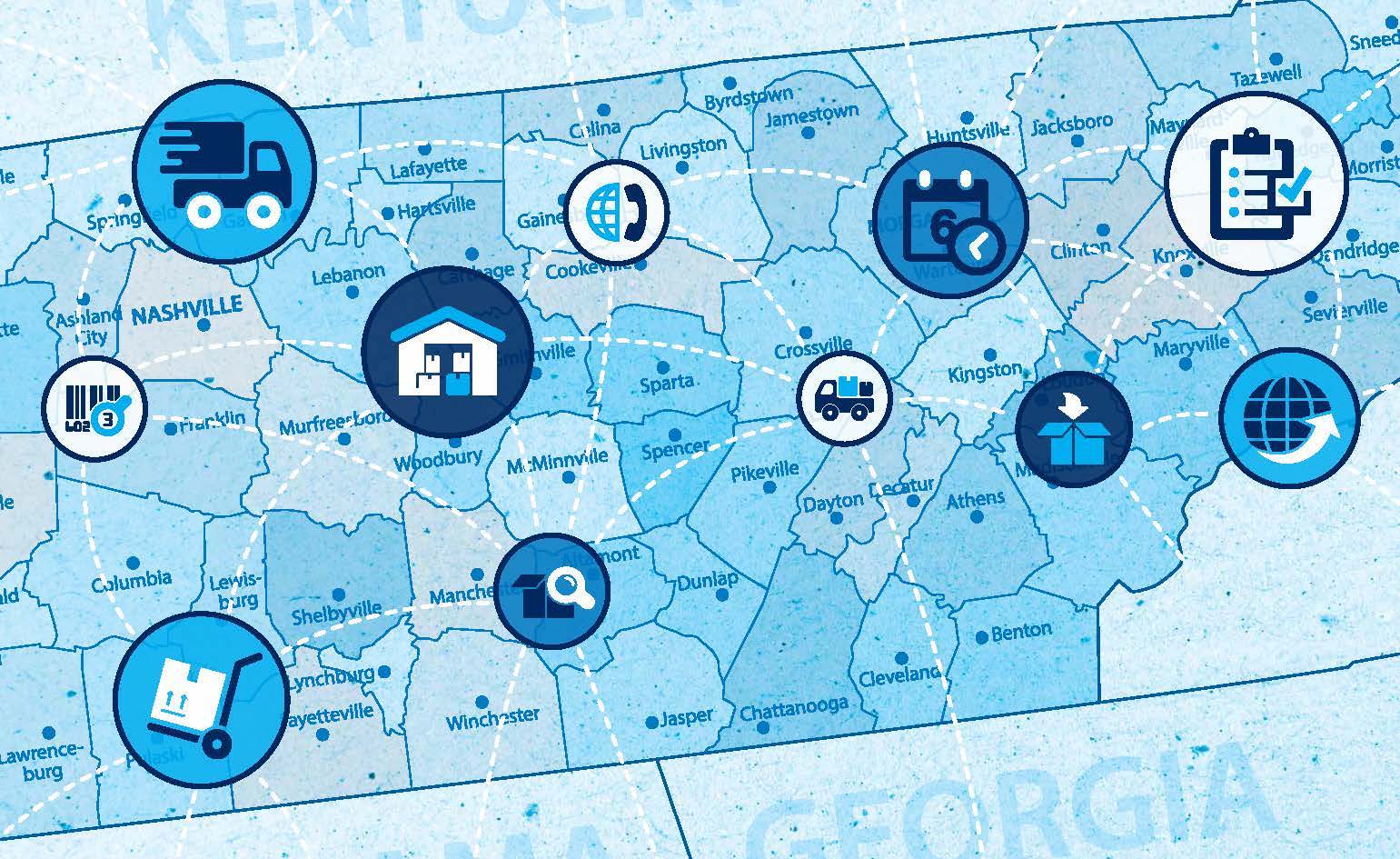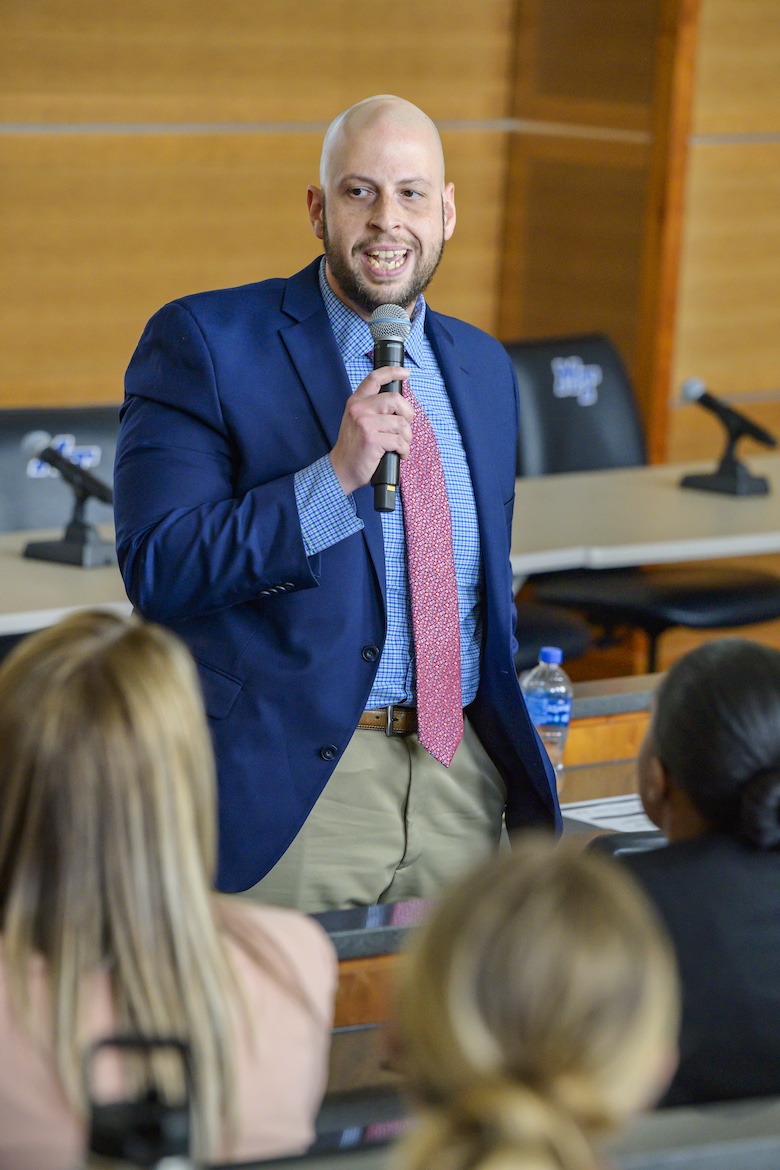American consumers are used to getting what they want — on the same day even. But supply chain issues over the past two years have disrupted that expectation.
Instead, Americans have become accustomed to images of large ships filled with billions of dollars of the goods they cherish floating outside the ports of Los Angeles and Long Beach — the busiest ports in the country. Athletic shoe company New Balance even made a commercial about it.
 Supply chain disruptions, product shortages, and delivery delays have certainly frustrated consumers and dominated news headlines. As a result, the importance of properly educated supply chain professionals has become more evident than ever.
Supply chain disruptions, product shortages, and delivery delays have certainly frustrated consumers and dominated news headlines. As a result, the importance of properly educated supply chain professionals has become more evident than ever.
MTSU is looking to address current and future challenges in this area through a new bachelor’s degree in Supply Chain Management launched last year. The Jennings A. Jones College of Business received approval in spring 2021 to transform its Supply Chain Management concentration into a standalone major that provides graduates a leg up in a booming profession that touches on areas ranging from purchasing to logistics to data analysis. MTSU also boasts a Supply Chain Management master’s program that was elevated from a concentration to a standalone degree starting this fall.
Supply chain management has directly played a role in the nation’s ability to combat COVID-19 and contribute to the health and safety of human life.

The center of it all
Supply chain specialists manage manufacturing, transportation, warehousing, inventory management, packaging, and logistics information dealing with everything from common consumer goods such as food, to electricity, natural gas and heating oil to power homes to life-saving equipment and supplies.
Richard Tarpey, an assistant professor in MTSU’s Supply Chain Management Program, makes the case that the industry is an integral part of almost all manufacturing or service-oriented businesses.
“In the last couple of years, the profession has elevated above the tasks of customer service, manufacturing goods, and providing goods and services to consumers,” Tarpey said. “Supply chain management has directly played a role in the nation’s ability to combat COVID-19 and contribute to the health and safety of human life through the delivery of vaccines, drugs, personal protection equipment, and life-saving medical devices, such as ventilators. Supply chains are at the center of environmental sustainability innovations.”
Supply chain management professionals also play a critical part in companies by providing forecasts, ensuring raw materials are available and making certain the right people are in the right place at the right time.
Middle Tennessee is a key link in the chain. With 50% of the United States’ population living within 650 miles of Nashville, Music City is a geographic sweet spot, since its location often translates to one- or two-day truck delivery times to more than 75% of all U.S. markets.

Richard Tarpey, assistant professor
Noting that the region is a logistics hub, faculty point out the local presence of supply chain behemoth Amazon, with multiple locations in the midstate, along with headquarters for Dollar General and Tractor Supply in the area.
That in turn places nearby MTSU andgraduates of its new Supply Chain Management degree squarely at the heart of global supply and demand.
Having a supply chain degree available from MTSU will certainly have an impact on our ability to hire people that already have roots in the middle Tennessee area.
MTSU’s program leverages its industry contacts to get access to real datasets for students to study and address, at some level, real-world problems. The University currently has six full-time faculty members and one adjunct professor teaching courses within the program, which is seeing increased demand at the graduate-degree level.
Shortages due to the pandemic have made supply chain management more visible. “It’s a career field that’s hot right now,” said Cliff Welborn, a Department of Management professor, “… and it’s a field people are interested in because they want to be part of the solution of how do I keep materials flowing so we can maintain our standard of living?”

Partner with industry
MTSU’s Department of Management first developed a Supply Chain Management concentration after listening to industry feedback for several years. The concentration experienced strong student demand over its initial three-year period — from 14 students to 112 and growing. Approval for a major from the MTSU Board of Trustees and the Tennessee Higher Education Commission followed.
Letters of support for the transition came from area logistics and distribution heavyweights — Ingram Content Group, Nissan North America, and Kasai North America, to name a few. Other major local employers of supply chain professionals include UPS, Amazon, Under Armour, Dollar General, Tractor Supply, Bridgestone, Geodis, Frito-Lay and Gap Inc.
It’s a career field that’s hot right now . . . and it’s a field people are interested in because they want to be part of the solution of ‘How do I keep materials flowing so we can maintain our standard of living?’
“There is a pressing need for qualified personnel that understand the current processes and systems used by industry today,” said Bob Henry, vice president of corporate purchasing with Kasai North America.
Rob Thyen, vice president of engineering and facilities for Geodis, and an MTSU Supply Chain Advisory Board member, said he believes having a supply chain degree available will greatly benefit the community, create collaborative research opportunities, and increase career placement within the midstate.
“As an organization that is one of the leading third-party logistics operations in the U.S., and headquartered in Brentwood, Tennessee, we are always searching for top talent with supply chain backgrounds,” Thyen said. “Having a supply chain degree available from MTSU will certainly have an impact on our ability to hire people that already have roots in the middle Tennessee area.”

MBA alumnus Tim Fallon (’11), now vice president of manufacturing for Nissan’s Mississippi plant, is active in MTSU’s Supply Chain Management program.
Area K–12 officials are on board with the program as well. Rutherford Works, the economic and workforce development division of the Rutherford County Chamber of Commerce, has worked with local employers for the past several years to help identify technical skills gaps and then worked with educational partners such as MTSU to develop training for the high-wage, high-demand jobs currently available in the community. As a result, MTSU’s Supply Chain Management faculty have been actively involved with Rutherford County Schools’ supply chain management pathway now available at seven high schools: Blackman, Riverdale, Stewarts Creek, Rockvale, Eagleville, Holloway, and Smyrna. Blackman, Riverdale and Stewarts Creek are the Nos. 1, 3 and 5 feeder high schools for MTSU.
Bright futures
![]()
All those prospective students will one day enter a workforce eager to have them. The Bureau of Labor Statistics indicates that transportation and material moving accounted for nearly 103,000 jobs in the middle Tennessee area in May 2019, or about 10.3% of local employment. The current demand for supply chain talent in the middle Tennessee region outpaces the supply of new graduates. A recent study by global logistics provider Dalsey, Hillblom, and Lynn, known as DHL, indicates that for every supply chain graduate, there are six to nine unfilled job openings.
Furthermore, according to the Association for Supply Chain Management, as recently as 2020 there were 191,000 jobs in supply chain management available in the U.S. alone, with an estimated growth of 31% expected between 2020 and 2030.

Jonathan Falcon, managing director of program partner Sunset Transportation, at MTSU’s Supply Chain Summit
Students looking for a degree that will pay dividends immediately clearly would do well to consider the new MTSU degree. According to Salary.com, the average supply chain manager salary in Tennessee is $106,056 as of February, but the range typically falls between $93,178 and $120,854.
“People choose to go into supply chain management for several reasons,” Tarpey said. “Probably the most well-communicated reason is there are many current opportunities in this continually growing field that pay well above the average entry-level jobs in middle Tennessee.”
He noted that supply chain professionals tend to be individuals who enjoy solving problems and can communicate across the various levels of an organization.
“Supply chain management jobs typically include the use of analytical and problem-solving skills to solve complex and critical challenges for companies,” he said.

Brittany Morton, senior transportation operations manager with program partner Geodis and an MBA student
Program faculty added that supply chain management is a common path to becoming a company CEO because of the broad experience involved. The field is upwardly mobile, with flexibility, different roles available, and no real ceiling. “There is a lot of job growth opportunities,” Tarpey said.
David Urban, dean of the Jones College of Business, summed up that the new BBA in Supply Chain Management meets the huge demand for skilled supply chain professionals throughout the Greater Nashville region. Industry, involved in MTSU classrooms, is seeking program graduates to solve issues.
“Employers and students are praising the Jones College program as a practical response to a real market need,” Urban said. “This program will grow as our region continues to be a go-to area for companies wishing to expand the efficiency and effectiveness of their supply ,chains.”
— by Jimmy Hart, DeAnn Hays, Darby Campbell-Firkus and Drew Ruble
The Human Touch
The elevation of its Supply Chain Management concentration to a stand-alone major isn’t the only significant recent change in MTSU’s Department of Management.
Jones College launched a Human Resource Management concentration in fall 2021 with the confidence that its courses align with guidelines from the Society for Human Resource Management , or SHRM, an HR professional organization considered the gold standard in the industry.
MTSU’s business college is now among more than 500 programs in approximately 425 educational institutions throughout the world that have met the guidelines to become SHRM-aligned. The guidelines were developed by SHRM to define the minimum content areas that should be studied by HR students at the undergraduate and graduate levels.
MTSU’s Kristie Abston, an assistant professor of management who spearheaded the effort, said the SHRM alignment adds stature to the concentration and will be a boost to graduates’ resumes.
“We formalized this program based on industry needs, career opportunities for our students, and providing something that’s tangible for their resumes,” Abston said. “Their certifications, the conferences they host … everything is world-class with SHRM. It is the premier organization for the HR profession.”
That’s important in a burgeoning industry with median salaries for HR professionals in the midstate ranging from $40,000 to $94,000, and with a jobs growth rate projected from 6% to 26% by 2026 statewide.
Jill Austin, department chair and the program’s coordinator, said HR courses in the concentration will also provide students with real-world learning opportunities.
“These high-impact experiential learning opportunities, along with the SHRM alignment, will prepare our students to be successful HR professionals,” she said.
The alignment also means that eligible MTSU students, with sufficient HR internships and related experience, may take the SHRM Certified Professional exam earlier than students from non-aligned programs. Otherwise, SHRM requires up to four years of professional HR experience, depending upon level of college education, before becoming eligible.
Within the concentration, students must take a core Human Resource Management course that all management majors take, plus four additional upper-level courses within the concentration: Talent Acquisition and Management, Training and Development, Compensation Management, and Strategic Innovations in Human Resource Management, which helps students review for the certification exam.

COMMENTS ARE OFF THIS POST